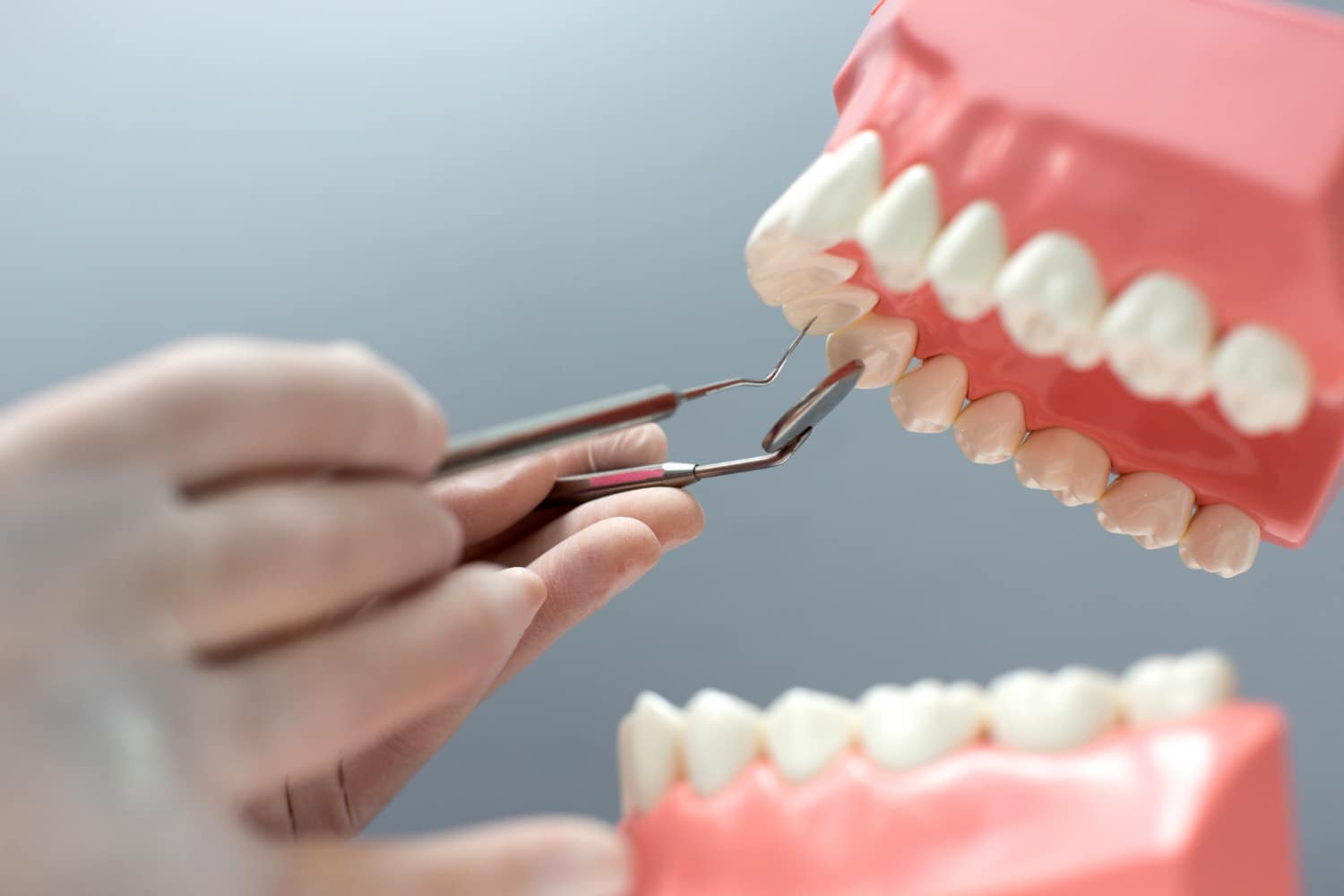Missing teeth are a source of anxiety for many people. The problem of missing teeth is both an aesthetic issue as well as a functional one and how this dental issue is resolved can have important implications for the patient’s future dental health. There are two important methods commonly used to solve the problem of missing teeth: dental bridges and dental implants. Making the decision about which of these dental restorations is right for you can have a lasting impact on the health of your teeth for years to come. At Green Tree Dental, we evaluate each patient on a case-by-case basis to determine which of these procedures is most appropriate and which procedure will offer the most lasting benefits.
What are dental implants?
Dental implants1 are anchored into the jaw with an artificial “root” that are typically made of titanium. The process of placing a dental implant in the jaw can take some time (usually several appointments over the course of several months), but one of the biggest benefits of implants is that the titanium anchor screw fuses with the patient’s jawbone, so the implant is incredibly stable and durable. During osseointegration, when the screw and the jaw bone are fusing together, a protective cover is placed over the screw implant to protect it.
Once osseointegration is complete, the cover is removed and a temporary crown is attached to the screw. This temporary crown is a placeholder for a permanent crown that will be put in place after the patient’s gums have grown and shaped themselves around the temporary crown. The process is complete when the temporary crown is removed and a permanent crown is attached to the well-anchored screw.
Pros and Cons of Dental Implants
Though the dental implant process may take longer to complete than the dental bridge process, and the initial costs may be higher, the results are much more durable. Often, at Green Tree Dental we see patients with dental implants that have lasted for 40 years or more. Patients who are trying to decide between dental bridges and dental implants need to consider durability and the cost of both methods of replacing missing teeth before deciding which procedure is right for them. The patients should consider the long-term restoration costs since dental bridges often must be removed and replaced every ten years.
What is a dental bridge?
A dental bridge is another dental restoration method that’s frequently used to replace missing teeth. Though the procedure used for dental bridge placement is less invasive than the placement procedure for dental implants, bridges have significant disadvantages that patients need to consider before committing to this procedure. First and most importantly, the procedure used to put a dental bridge in place requires that the surrounding teeth be permanently altered so that they can be used as anchors for the bridge. This alteration of the surrounding teeth is permanent and irreversible.
Pros and Cons of Dental Bridges
When a patient uses a dental bridge to replace a missing tooth, the root of the tooth is not replaced as it is using a dental implant. Rather, a bridge is placed between two healthy teeth that are altered to suspend the bridge over the missing tooth space. Dental bridges literally “bridge” the gap between teeth. The durability and stability of the restoration is ultimately dependent on the stability of the surrounding teeth. Bridgework requires that these healthy, surrounding teeth be altered.
So, while dental implants are technically more invasive because a titanium screw must be placed in the jaw where the missing tooth once was so that it can integrate with the jaw bone, many patients experience bridgework as an invasive procedure as well because adjacent teeth must be significantly altered in order for the bridge to be put in place. At Green Tree Dental, we typically encourage patients to go through the extra effort and expense to get dental implants if they qualify for the implant procedure because bridges are less stable, last a shorter period of time, and they involve the permanent and irreversible alteration of healthy teeth.
Dental Implant Candidacy
Not every patient is a good candidate for dental implants, but when patients qualify for this procedure, we encourage them to carefully consider the benefits of dental implants over dental bridges.
A good candidate for dental implants is an adult patient who is no longer experiencing bone growth. Jaw bone density and quality is an important consideration for determining candidacy for this procedure. We use X-rays or CT scans at Green Tree Dental for assessing the patient’s bone density to determine whether they would be a good candidate for implants. A healthy bone structure is essential in order for dental implants to be successful.
Non-smoking patients are most likely to experience success with dental implants. Patients who smoke may want to consider kicking the habit in order to qualify for dental implants if they have missing teeth that they’d like to replace with a durable, long-lasting restoration.
And finally, patients should be in good general health to qualify for dental implants. Patients who are suffering from diabetes, periodontal disease, or cancer may need to seek out additional treatments in order to qualify for dental implants. Patients with certain health conditions may be more suitable candidates for a dental bridge.
Dental Bridge Candidacy
Qualifying for a dental bridge is less restrictive than qualifying for implants because this procedure is less invasive in certain respects. The most important consideration for this procedure is the health and stability of the adjacent teeth that will be altered and then used to anchor the dental bridge. Patients with periodontal disease, extreme tooth decay, or chips or cracks in the adjacent teeth may need to undergo additional dental procedures in order to be able to successfully replace their missing teeth with a bridge.
Dental Implants vs. Dental Bridges Comparison
At Green Tree Dental, we generally recommend that patients get dental implants if they qualify for the procedure because of the many benefits of implants in comparison with dental bridges. Our patients report that they are much happier with the results of dental implant surgery and typically, dental implants last much longer than bridges. As a result, the costs of a dental implant over time tend to be much lower than the cost of a bridge. And while the initial time investment required to place a dental implant might be higher than what’s required to place a bridge, the results last longer and patients rarely have to replace implants.
Patients who are considering dental implants should speak with a dentist2 to determine whether or not they qualify for the procedure.


